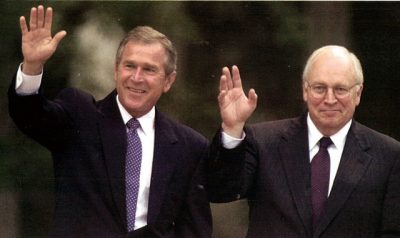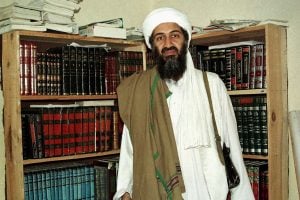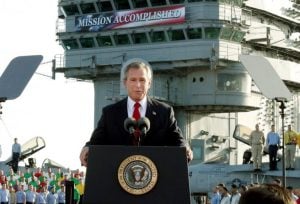The War Crimes of Bush and Blair – Afghanistan and Iraq

“The invasion of Iraq was a bandit act, an act of blatant state terrorism, demonstrating absolute contempt for the concept of international law…We have brought torture, cluster bombs, depleted uranium, innumerable acts of random murder, misery, degradation and death to the Iraqi people and call it ‘bringing freedom and democracy to the Middle East’.” (Harold Pinter, Nobel Prize for Literature Speech, 2005)
Following the terrorist attacks on the World Trade Centre Twin Towers in New York, on September 11, 2001, (known as 9/11) the US declared a global war on terror. Since then it has destroyed Afghanistan, Iraq and Libya. It has supported the destruction of Yemen, and the attempted destruction of Syria. (Libya, Syria and Yemen will be discussed in a subsequent post).
Afghanistan
For many years, Afghanistan has been seen as a key area in what is known as ‘The Grand Chessboard’ – It is important for control of immense energy resources (oil and gas) in central Asia. Up until 1989, the US government had been unable to take control of the region because of the proximity of the Soviet Union. The collapse of the Soviet Union in 1989 changed this. Immense deposits of oil and gas in the region are now accessible to Western corporations. Not only does Afghanistan have its own deposits of natural gas, it is the obvious choice for numerous pipeline routes.(1)
The US and its allies invaded Afghanistan in October 2001. The explanations given for the invasion included dealing with the al-Qaida terrorist network, led by Osama Bin Laden, and to replace the extremely repressive Taliban government with a better one for humanitarian reasons. As with the justifications for other wars, these reasons were repeated by the media with little questioning. However, most of the 9/11 terrorists came from Saudi Arabia. It was widely recognised that most of the al-Qaida network would have dispersed before the attacks, and the attempted removal of the Taliban left equally violent warlords in power in many parts of the country. The US had been negotiating with the Taliban about building oil pipelines late into the 1990s, but the Taliban were not sufficiently cooperative. The US had therefore decided to “bury you [the Taliban] under a carpet of bombs” shortly before the 9/11 attacks.(2) The US went ahead and dropped plenty of bombs, but this has not decreased terrorism in the region. Predictably, the first US representative in Afghanistan was connected to the oil industry, and had been involved in earlier negotiations to build pipelines.(3)
The war in Afghanistan does not receive nearly as much media coverage as the Iraq war, but thousands of Afghan citizens are still being killed every year.(4) Wikileaks released files showing that the US military is aware that they have killed hundreds of thousands of people in Afghanistan.(5) The country has been in chaos for almost 20 years.
Iraq
Britain and the US helped to overthrow the leadership of Iraq in 1963. Saddam Hussein became President of that Iraqi government in 1979. The US and Britain supplied him with weapons for many years, despite knowing that he was a murderous dictator. They encouraged him to fight a war throughout the 1980s against Iran(6), creating devastation in the region. In 1991, Saddam invaded the neighbouring country of Kuwait. In response, US forces invaded Iraq. This was known as Gulf War 1. President H.W.Bush stated that the issue in Kuwait was not democracy, but to “prevent a dictator…from seizing control of more than a quarter of the world’s oil reserves”.(7) There were opportunities to negotiate a peaceful resolution with Iraq in 1991, but the US leadership did not want this to happen so they deliberately suppressed information about possible non-violent solutions, and the media also failed to discuss these alternatives(8). Throughout the 1990’s Britain and the US continued to wage war against Iraq, bombing it approximately once every three days.(9) In 2003, the US and Britain carried out a full-scale invasion, known as Gulf War 2. Immediately following the invasion, US forces secured the oilfields and the ministry of oil, but not much else.(10)
Image below: George W. Bush declares victory in Iraq War, USS Abraham Lincoln, San Diego, May 1, 2003)
The 2003 invasion of Iraq was an excellent example of the way in which the US and British governments try to scare us into supporting war by exaggerating threats. First we were told that we should be afraid because Iraq was making Weapons of Mass Destruction (WMD), but the only WMD that Iraq might have had were old, degraded chemical shells.(11) Then we were told lies about Saddam’s links to terrorism. The ‘links to terrorists’ explanation was always doubtful as Saddam Hussein’s government was secular (non-religious) and he was therefore an unlikely ally of religious terrorists. Finally we were told that we had to invade for humanitarian reasons – essentially ‘Saddam is a bad man’ – but Britain and the US had actively helped him when he had committed earlier atrocities. The US and British governments lied repeatedly to justify the invasion.(12) There were forgeries supposedly showing that Iraq was trying to buy nuclear material from Africa(13), and a ‘dodgy’ dossier(14) trying to convince journalists that Saddam was a serious threat. None of these had much evidence to back them up, yet, as with earlier interventions, they were repeated by the media without adequate scrutiny. The government decided on its plan, then tried to pick and choose selective pieces of information to fit that plan. Iraq was slightly unusual in that lots of people did not believe any of these scare stories. Millions of people protested against the war in many countries,(15) including huge protests in Britain and the US, but the invasion went ahead anyway.
The extent of the lies has been admitted by former government insiders. The head of the CIA, George Tenet, has now admitted briefing George Bush that Saddam did not have any weapons of mass destruction, and other sources have admitted that the intelligence information was “being fixed around the plan.”(16) In other words, the invasion was going ahead and the politicians needed an excuse. There is an unofficial record of notes by the US Secretary of Defence, Donald Rumsfeld, from the afternoon of September 11th 2001 (just a few hours after the 9/11 terrorist attacks) which says: “best info fast. Judge whether good enough hit S.H. [Saddam Hussein] at same time. Not only U.B.L. [Usama Bin Laden]. Sweep it all up. Things related and not.”(17) Rumsfeld wanted to see if the terrorist attacks could be used to justify invading Iraq. He repeatedly asked for evidence to connect Iraq to the terrorist attacks but the CIA was unable to find any.
Former British Prime Minister Tony Blair supported these policies and actively participated in the lies. He has written that “[Vice-President] Cheney wanted forcible ‘regime change’ in all Middle Eastern countries that he considered hostile to US interests”.(18) This strategy has been confirmed by former US general, Wesley Clark, who admitted that in 2001 he was told that US President Bush and US Secretary of Defense Rumsfeld wanted to ‘take out’ seven countries in five years. These were Iraq, Somalia, Syria, Libya, Lebanon, Sudan and Iran.(19) President Bush’s Energy Secretary, Paul O’Neill, has disclosed that President Bush came into office planning to overthrow Saddam.(20) Although the war began two years later, the decision to invade Iraq was made less than two weeks after 9/11. One US commentator pointed out “This is a war of an elite. I could give you the names of 25 people [in Washington] who, if you had exiled them to a desert island a year and a half ago, the Iraq war would not have happened”.(21)
For all practical purposes, Iraq has now been destroyed. It no longer exists as a single country and has disintegrated into regional power bases, with widespread ethnic cleansing in each region.(22) It is estimated that approximately two million people have died in Iraq since the invasion,(23) and millions more have been displaced. This has been described as genocide.(24) Many people have fled the country and others are homeless within the country. Over half of Iraqis have had a close friend or relative killed or injured, and a whole generation of people growing up from 1991 to the present day have been traumatised. The invasion and destruction of Iraq is almost certainly the worst crime of the 21st Century.
Key Points
The invasion of Afghanistan was not about terrorism or humanitarianism.
The invasion of Iraq was not about weapons of mass destruction, or humanitarianism, or links to terrorism.
Both wars were part of a wider policy of US imperialism and control of energy resources.
*
Note to readers: please click the share buttons above or below. Forward this article to your email lists. Crosspost on your blog site, internet forums. etc.
This article was first posted at medium.com/elephantsintheroom
Rod Driver is a part-time academic who is particularly interested in de-bunking modern-day US and British propaganda. This is the third in a series entitled Elephants In The Room, which attempts to provide a beginners guide to understanding what’s really going on in relation to war, terrorism, economics and poverty, without the nonsense in the mainstream media.
Notes
1) Mark Curtis, Web of Deceit, pp47-74
2) Michael Meacher, ‘This war on terrorism is bogus’, 6 Sep 2003, at www.guardian.co.uk/politics/2003/sep/06/september11.iraq
3) Patrick Martin, ‘Oil Company Advisor named US representative to Afghanistan’, WSWS, 3 Jan 2002, at
https://www.wsws.org/en/articles/2002/01/oil-j03.html
4) BBC News, ‘Afghanistan’s Ghani says 45,000 security personnel killed since 2014’, 25 Jan 2019, at
https://www.bbc.co.uk/news/world-asia-47005558
5) Wikileaks, ‘Afghan War Diary, 2004-2010’, 25 July 2010, at
https://wikileaks.org/wiki/Afghan_War_Diary,_2004-2010
6) https://en.wikipedia.org/wiki/United_States_support_for_Iraq_during_the_Iran%E2%80%93Iraq_War
7) Thomas Friedman, ‘Haiti’s Coup: Test Case for Bush’s New World Order’, Oct 4 1991, N.Y.Times, at
https://www.nytimes.com/1991/10/04/world/haiti-s-coup-test-case-for-bush-s-new-world-order.html
8) David Edwards, ‘Where Egos Dare’, 12 Jun 2002, at
https://www.indymedia.org.uk/en/2002/06/33629.html
9) Jeffrey St. Clair, ‘Iraq as Prison State’, Oct 15, 2002, in Alexander Cockburn and Jeffery St. Clair, Imperial Crusades: Iraq, Afghanistan and Yugoslavia,
10) Derek Gregory, Colonial Present: Afghanistan, Palestine, Iraq, p.220
11) Jon Schwarz, ‘Twelve Years Later, US Media Still Can’t Get Iraqi WMD Story Right’, 10 April 2015, at
12) Jon Schwarz, ‘Lie After Lie: What Colin Powell Knew About Iraq 15 Years Ago and What He Told The U.N.’, 6 Jan 2018, at
13) https://en.wikipedia.org/wiki/Niger_uranium_forgeries
14) https://en.wikipedia.org/wiki/Iraq_Dossier
15) https://en.wikipedia.org/wiki/15_February_2003_anti-war_protests
16) Sidney Blumenthal, ‘Turning Truth Into Lies’, Guardian, 7 Sep 2007, at
https://www.theguardian.com/commentisfree/2007/sep/07/turningtruthintolies
17) Paul Krugman, ‘Osama, Saddam and The Ports’, 24th Feb, 2006, at
http://economistsview.typepad.com/economistsview/2006/02/paul_krugman_os.html
Thad Anderson, blogger who found the memo from a FOIA request, posted at
https://www.flickr.com/photos/66726692@N00/100545349/
Note that the spelling is usually Osama, but Usama is used in the memo.
18) Tony Blair, A Journey: My Political Life, discussed in Robert Parry, ‘Blair reveals Cheney’s war agenda’, 6 Sep 2010, at
http://www.consortiumnews.com/2010/090610.html
19) Wesley K. Clark, A Time To Lead: For Duty, Honor and Country, 2007
Joe Conason, ‘”Seven countries in five years”’, 12 Oct 2007, (mentions memo from 2001) at
http://www.salon.com/2007/10/12/wesley_clark/
20) BBC News, ‘Bush ‘plotted Iraq War from start’’, 12 Jan 2004, at http://news.bbc.co.uk/2/hi/americas/3387941.stm
21) Thomas Friedman, cited in James S. Henry, The Blood bankers, p.304
22) Gareth Stansfield, ‘Accepting Realities In Iraq’, May 2007, at https://reliefweb.int/report/iraq/accepting-realities-iraq
23) Medea Benjamin and Nicolas J.S.Davies, ‘The Iraq Death Toll 15 Years After the U.S. Invasion’, 15 March 2018, at
https://www.commondreams.org/views/2018/03/15/iraq-death-toll-15-years-after-us-invasion
24) Abdul-Haq al-Ani and Tarik al-Ani, Genocide in Iraq Volume II: The Obliteration of a Modern State, 2015



